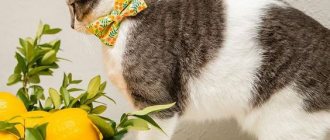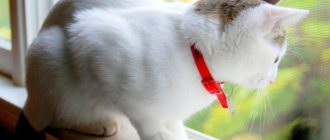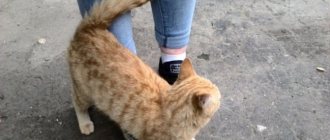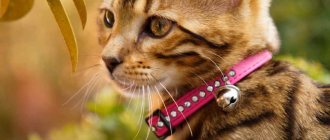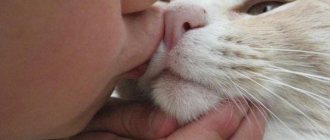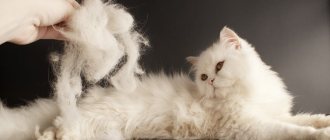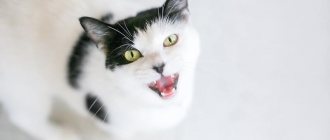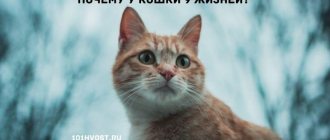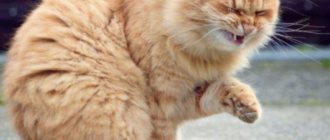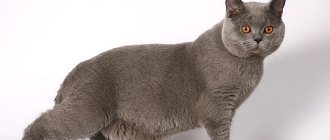Scientists have not yet come to a clear conclusion why cats love valerian. Many of us have had to observe a situation where the mere smell of valerian plunged cats into complete ecstasy, turning independent and calm animals into affectionate and obsessive ones, ready to do anything for a drop of the coveted liquid.
But no matter how much a pet begs for a fragrant treat, the owner should know that a medicine that is beneficial to humans is not so harmless when it comes to the cat family, and sometimes it is simply dangerous.
Why cats love valerian
Interestingly, the herb that serves as the raw material for making valerian tincture is popularly called “cat root” or “cat grass.” This is a perennial herbaceous plant that grows in damp places and lowlands.
Cats smell this grass from long distances, gather around them, try to damage the massive stem and lick the juice that comes out from it. After eating this plant, animals jump, roll on the ground and meow loudly.
The medicinal plant and its preparations, which have a calming effect on people, are a strong stimulant for cats. After consuming it, the animal experiences a period of strong excitement, which is followed by loss of strength and drowsiness.
There are several versions explaining why cats like valerian, and why cats react so much to its smell, regardless of the form in which the drug is presented.
- The aroma of the plant reminds cats of the smell of pheromones contained in the urine of animals that are ready to mate. This hypothesis looks quite logical if we take into account that castrated animals and kittens under 5 months who have not reached puberty do not react to smell.
- Some animals use valerian to treat stomach pain.
- The reason for the passionate love of the cat family for valerian lies in the substance actinidin contained in the root of the plant, which acts on animals like a drug and can be addictive.
Just as valerian affects cats, narcotic substances affect humans.
Education and training
Some owners take advantage of their cats' addiction to valerian to quickly accustom their pets to a tray, scratching post or bed. Veterinarians and animal psychologists consider such methods inhumane, because the plant’s bioflavonoids cause serious damage to the nervous and endocrine systems of cats.
If you need to discourage a cat from using the toilet in the wrong place, you should use more unpleasant but harmless aromas, for example, black pepper or citrus.
To evoke sympathy for a toy, bed or scratching post, it is better to use catnip. This herb is harmless and does not cause addiction or adverse mental reactions. The extract is available in the form of oil or water drops and is sold in specialized pet stores.
1111
How does valerian affect cats?
The narcotic effect of valerian on cats can cause hallucinations in animals, and in some severe cases, even the death of the animal. Valerian can be dangerous for a cat, and it is important to remember this.
Now, knowing the effect of valerian, let’s figure out what happens if you give a cat a fragrant mixture. Why do cats get so excited just when they smell the coveted medicine?
Cats resort to a source of fragrance, and if you give them a sniff of a bottle of medicine (everyone has seen how cats react to this), they begin to lick it obliviously and roll on the floor.
After ingesting even a drop of liquid, the cats' behavior changes. They begin to run around the room, scratch furniture and carpets, and often meow loudly. After the excitement, a period begins that calms the cat, followed by a narcotic sleep that can last several hours.
Having found out the mechanism of how valerian acts on cats, and having learned what will happen if the cat is only given to smell it, a loving owner will try to eliminate such situations.
Can an overdose happen?
In addition to an allergic reaction, the animal may experience an overdose. It is accompanied by:
- complete loss of coordination;
- falling on the side;
- rolling your eyes;
- convulsions;
- copious discharge of foam from the mouth.
If these signs appear, you must immediately take your pet to the veterinary clinic. Otherwise, he may die from cardiac arrest.
To avoid overdose, strictly follow all doctor's recommendations and do not self-medicate. Remember that all medications should be kept out of the reach of pets.
Can cats have valerian?
Owners often wonder whether it is possible to give cats valerian tablets. Veterinarians are categorically against such experiments. They claim that giving valerian to cats is not only harmful, but also dangerous to their health. This is especially true for the drug in tablets.
Two-thirds of the valerian tablet consists of excipients that are of synthetic origin and cause severe allergic reactions in pets. What should you do if your cat ate a pill that accidentally fell on the floor?
From such a small dose, most likely, nothing terrible will happen. While the remedy is in effect, the animal will purr, roll on the floor, and then fall asleep. However, it can be addictive, so you need to be extremely careful.
Both in tablet and liquid form, this drug, which cats are simply obsessed with, is equally harmful to them. It can cause particular harm to an unformed body, therefore it is strictly contraindicated for kittens and dangerous for a pregnant cat.
Overdose symptoms
Can a cat die from valerian after consuming a large amount of the medicine? Current veterinarians answer this question unequivocally in the affirmative. Here you need to take into account the dosage.
Since each organism is individual, and susceptibility to this drug is determined genetically, experts cannot yet say how much a cat needs to take this medicine for death to occur. Therefore, at home it is necessary to protect your pet from contact with valerian tincture.
It is impossible to predict the reaction of a particular animal if you feed or drink it with an aromatic mixture. Some incompetent owners try to give the cat valerian to calm him down and do not expect that the opposite situation may occur. The pet will fall into a state of euphoria, behave inappropriately and stop responding to any influences.
The greatest threat to the life of furry pets is an overdose of the drug, which overloads the nervous system and leads to seizures. Signs of overdose are:
- white foam at the mouth;
- the animal lies on its side and its eyes roll back.
If your cat has eaten valerian and at least one of these symptoms is observed, do not hesitate to contact a veterinarian!
The mechanism of action of valerian on cats
Despite the fact that the drug is completely harmless to humans, it is not worth checking what will happen if you let a cat smell valerian. Even a calm and good-natured animal will fall into ecstasy and begin to scream wildly, growl and twitch from the highest degree of pleasure.
At the end, the pet pokes its muzzle into the place where the valerian was poured and falls into oblivion or sleep. From the outside it may seem comical and entertaining, but in fact, the animal can be seriously harmed. Volatile substances negatively affect the central nervous system, alter behavior and harm overall health.
Modern veterinarians are convinced that valerian is a powerful dissociative agent for cats, significantly distorting the perception of visual and sound images. If we talk about specific examples, marijuana has a similar effect on humans.
This opinion is confirmed by the fact that cats, having drunk valerian, often attack invisible enemies, hide from an imaginary pursuer, or catch non-existent prey. In this state, cats react sharply to extraneous sounds and may fall into causeless panic.
In particularly difficult cases, pets may fall, their body begins to shake convulsively, foam comes out of the mouth, and their eyes become crazy. They may begin to hallucinate, causing them to attack their owner or children.
Therefore, before you offer your pet valerian for fun, think about its harm to the animal’s health and the possible consequences for yourself.
Benefits of Valerian
Scientists still cannot understand why cats react to valerian. A loving owner should keep in mind that there are effective and reliable drugs to calm domestic cats, such as Stop Stress, Fitex, Kot-Bayun and many others. There is no need to risk your pet's health and use a medicine that brings the opposite result.
However, you should not cross out valerian root from the list of medications that can be given to your cat. Practicing veterinarians will give a lot of examples characterizing how beneficial valerian is for cats.
- Due to its effect on the animal’s hormonal levels, valerian is used in the treatment of cats with thyroid diseases.
- It is used as a medicine for diseases of the gastrointestinal tract.
- In veterinary therapy for the treatment of heart problems and nervous diseases.
What to choose: roots, drops or tablets
The drug has 3 dosage forms: roots, drops and tablets. If you choose valerian for cats, then it is better to avoid tablets and alcohol tinctures. Ethyl alcohol contained in drops can burn the mucous membrane, cause alcohol intoxication and harm the kidneys and liver. The danger of tablets lies in their fillers. The abundance of synthetic substances (75% of the total composition) is fraught with allergic reactions and constipation.
If the doctor recommended a plant for treatment, then it is given to the animal in its natural form - that is, in the roots. You can also prepare a decoction or infusion from the roots, but without adding alcohol.
Is valerian harmful for cats?
In some cases, you can give your cat valerian, but if you exceed the dose, you risk simply not having time to contact a veterinarian.
Valerian for cats can become a drug, the same as nicotine for humans. And there is an explanation for this. Members of the cat family may become addicted to some plants after just one use. Among them is valerian. and cats are influenced by it.
In addition to the herbal valerian officinalis, valerian tincture contains 70% ethyl alcohol. Since valerian has a stimulating effect on cats, the dependence caused by the alcohol contained in the extract aggravates its destructive effect on the animal’s body.
Observations have shown that not every cat is blown away by the aromatic drug and not all of them develop dangerous symptoms after consuming it.
Do all cats have this reaction?
Valerian is liked by many cats, but not all. For example, only 70% of domestic cats react to it, while 30% remain indifferent to valerian. Kittens under 12 months of age are least sensitive to the smell of the plant, and cats of reproductive age are the most sensitive. As for catnip, its influence also does not apply to all pets. Scientists suggest that catnip causes a hallucinogenic and psychotropic reaction only in those cats who have a special gene. If animals do not have it, they do not show the slightest interest in the plant.
It is also useful to read: Is it possible to drink valerian during pregnancy?
Valerian also affects large representatives of the cat family, and its effect on them is also explained by the similarity of the odors of feline and actinidin. However, in large animals the effect of valerian is much less pronounced. This is primarily due to the size of the animals and the dose of valerian. In natural conditions, cats can find grass or roots, but will not consume them in large quantities. For a domestic cat, even one tablet of valerian or a spoonful of decoction is a serious dose, but for a tiger or leopard this same amount will be unnoticeable.
On a note
Valerian and catnip are used by scientists and filmmakers who observe wild animals in natural conditions. The smell of these herbs helps to attract cats to the shooting locations.
Why don't all cats get euphoric?
There is no clear opinion why not all cats fall into euphoria from the fragrant medicine. An inadequate reaction of a cat to valerian occurs in 70% of cases. Scientists have noticed that not every cat reacts to the smell of the mixture.
In addition, it has been proven that females are much more relaxed about the smell of valerian. During the experiment, out of three animals, only two cats reacted to the smell, falling into a state of euphoria.
Our pets are completely dependent on us. Therefore, it is in our power not only to feed them with high-quality food, but also to protect them from situations in which cats can harm themselves.
Conclusion: to give or not to give?
The use of valerian for cats for medicinal purposes is practiced very rarely and only as part of auxiliary therapy. In most cases, it is safer to use alternative medications and herbs.
When is Valerian good for cats?
The use of roots and decoctions is permissible for thyroid dysfunction, fever, intestinal spasms, neuroses and muscle atony. In addition to preventing serious pathologies, the herb can help increase activity and restore appetite.
The disadvantages of the plant outweigh its advantages. When treating pets, it is better to use safer drugs, the reaction to which is easier to predict.
What is valerian officinalis
Valerian (cat grass, meun) is a plant belonging to the genus of herbaceous perennials. The effect on humans can be described as sedative and antispasmodic.
Valerian officinalis has become an excellent assistant for people in the treatment of diseases associated with periodic headaches, gastrointestinal dysfunctions, and abnormalities of the cardiovascular system. Frequent use is due to insomnia and nervous excitement.
There are a large number of preparations in which valerian roots have found their use.
The Mediterranean is considered to be the birthplace of the plant. Valerian officinalis is a heat-loving plant, often found in temperate and subtropical climates. It is impossible to find this grass only in areas of permafrost and drought, for example, in the Far North and Central Asia. The plant prefers areas with marshy soil, damp forests, banks of water bodies, meadows. Valerian is rich in useful substances:
- acids: butyric;
- vinegar;
- formic;
- valerian;
Dosage forms
Pharmacies sell various medicines containing valerian. The release forms of valerian itself are:
- tincture or drops;
- powder;
- pills.
Often in pharmacies you can find crushed dry herbs for making tea or decoction.
The dangers of valerian preparations for cats
Under no circumstances should you give your animal human medications. They may contain other additives, including synthetic ones, that are harmful to furry animals and may be too strong for the cat's body. We are talking about valerian in tablets. This form of medication contains additional substances that can cause allergies in the pet.
An alcohol tincture of valerian root is no less dangerous for a cat if the animal decides to lap it. Alcohol in any dose is poison for the cat’s body. Ethanol begins to act almost instantly after it enters the body. Ethanol poisoning occurs. Like in humans, it manifests itself as intestinal disorders, nausea, vomiting, drowsiness, impaired coordination of movement, and loss of consciousness.
If the cat drinks the tincture to its fill, valerian intoxication occurs. The animal loses coordination, the doorway becomes too small for the cat, and it may not fit into the litter box. Hallucinations may occur. The cat lunges at a non-existent object or another animal. This is noted precisely from taking an alcohol infusion. Afterwards, the pet begins to experience something similar to a hangover - appetite worsens or is absent, sleep is disturbed, and apathy. It is believed that cat alcoholism develops very quickly.
The dependence on valerian is strong. And the animal will suffer withdrawal symptoms after each use of the product.
The cat will become dependent and will demand a new dose from the owner or search for it himself in cabinets and shelves.
How to make an infusion to treat certain diseases
Valerian and cats can be compatible, if, of course, the herb was prescribed to your pet by a veterinarian. For medicinal properties, it is used when the root of the plant is previously crushed and infused in boiling water (5 grams of the root is infused in a glass of boiling water for 2 hours in a water bath).
You can give the infusion strictly in the dosages prescribed by the veterinarian, otherwise an overdose may occur.
Consequences
Cats can very easily be “hooked” on valerian, because they are partial to it, just as alcoholics are partial to alcohol. Everyone knows that valerian root is infused with spirit. Since cats have no resistance to alcohol, they can quickly become drunk.
Before pouring a dose of “alcohol” into your pet, you should think about how alcohol affects the human body. It turns out that under the influence of valerian, the cat’s body is very quickly destroyed. In the near future, you can expect the following consequences of the fun:
- stomach ulcer;
- renal failure;
- inhibition of actions;
- liver diseases.
